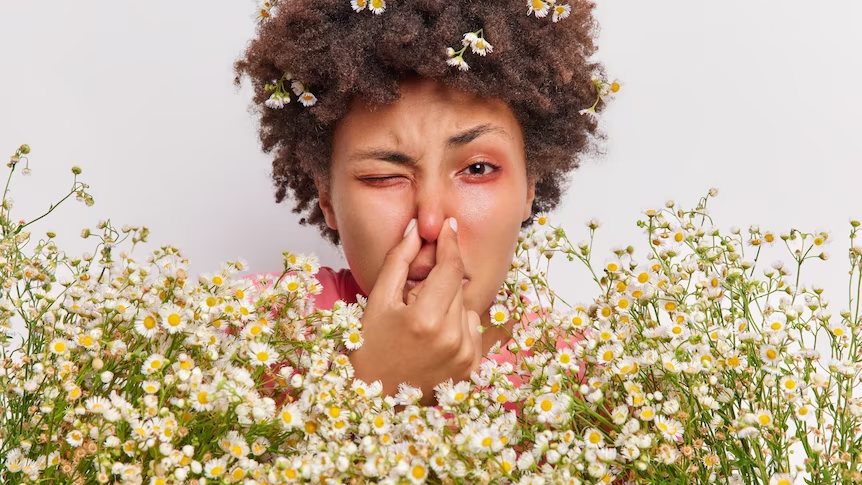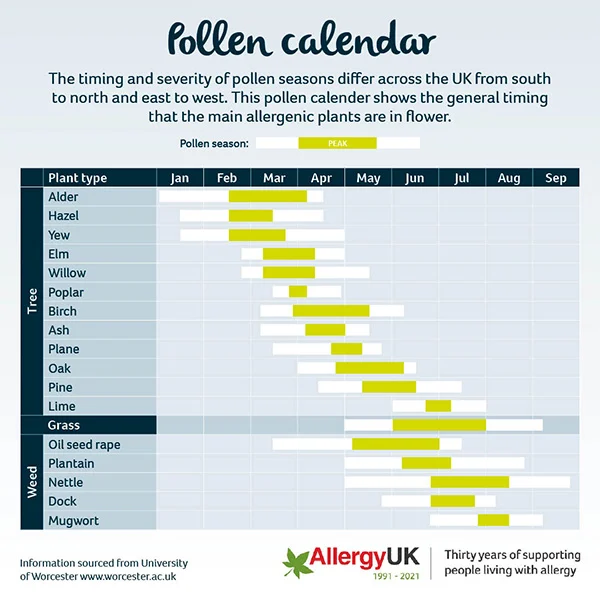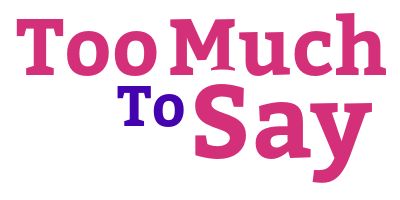
As the weather gets warmer I can’t help but think about the seasonal allergies we are quickly approaching. Imagine a summers morning — you’ve walked the 30 minutes to work in the sun to get your steps in and avoid the crumbling public transport system. You get a slight sniffle as you walk into your building, you rub your eyes as you stand waiting for lift to take you up, and sneeze a couple of times before you sit at your desk. This is just the start.
At 18 I sat my last school exams with a doctor’s note on hand about my severe hay fever; a toilet roll at my desk so I could constantly blow my nose…and wouldn’t run out of tissue when that caused a nosebleed; and an ice-pack wrapped in a tea towel to hold up to my swollen itchy eyes when the irritation was too much. I have had the worst of the worst of hay fever symptoms. So, I want to share with you every remedy, medication and old wive’s tale I’ve tried and recommend, for the slightest snifflers to the chronic suffers like myself.
General Tips and Advice
- Try and determine what pollen you are allergic to by checking a pollen calendar — if grass pollen is your enemy stay away from freshly cut grass at all costs.
- Pollen levels are highest in the early morning and early evening. Avoid spending time outside during these times.
- When you are outside, where sunglasses to avoid pollen getting in your eyes.
- Avoid eye makeup that pollen can adhere to, especially mascara.
- Put Vaseline, lip balm or bees wax under your eyes and around the base of your nostrils to catch pollen on your face and avoid it irritating you. HayMax is designed especially for this. But be mindful not to then rub the balm and pollen into your eyes or nose!
- Keep long hair tied back and wash it regularly.
- Keep windows closed to avoid pollen coming into the house.
- Dry clothes, sheets and towels inside to avoid pollen sticking to them.
- Regularly change pillow cases.
- Avoid drinking alcohols high in histamines ie. red wine, beer, cider, rum.

Medication
The group of medications used to treat hay fever is called antihistamines. As allergens like pollen cause the production of histamines within the body that irritate our sinuses and eyes, antihistamines prevent the production of these histamines therefore relieving our symptoms. This is the same response that occurs when someone is allergic to a particular food.
As more and more of us experience hay fever, medications that used to only be available with a prescription now don’t require them, making effective treatment cheaper and more accessible (in the UK that is). Always look for the active ingredient in a medication (listed below). The higher price of a brand name does not mean it is more effective, so I always buy own-brand medication as long as the active ingredient and dose is the same.
Cetirizine: Known also by brand names Piriteze or Banadryl, is a once-a-day tablet that should be your first port of call when starting to take anti-histamines. Try taking it on days/weeks where you feel the most effected first, before taking in the morning once a day.
Loratadine: Also known as Clarityn. Similar to Cetirizine – a once a day tablet that is low in cost with a similar level of effectiveness. Try this if you see no improvement with Cetirizine.
Fexofenadine: Also known as Allevia, is a little harder to find in the shops as this was previously only available on prescription due to its strength. If you haven’t had success so far with medications, this could be your golden ticket. I take this consistently every morning during hayfever season.
Chloraphenamine: If you are still not satisfied with the improvement of your symptoms, try adding this medication in alongside Fexofenadine. Known also by the brand name Piriton, can be taken up to 4 times a day, but is only recommended for short term use. It can cause quite a lot of drowsiness in my experience, so I would first try taking it once before bed.
Other Medical Treatments
Nasal Sprays: If your symptoms are localized to your sinuses (runny nose, sneezing, inflammation) then using a nasal spray may be the most effective treatment. The most commonly available have the active ingredient Beclometasone Dipropionate, like Beconase. Make sure to point the spray to the outside wall of each nostril — you don’t want to just swallow the spray, or cause yourself nosebleeds from improper use.
Eye-drops: If your symptoms are localized to your eyes (itchy, watery, swollen, dry) then eye-drops may be the most effective treatment. Eye-drops containing 2% sodium cromoglicate are the most effective that are available over the counter. If you do not find these effective with use as directed, a doctor may be able to prescribe you stronger steroid eye-drops.
Steroid Injections: A treatment that is only offered privately in the UK and not widely recommended, an triamcinolone injection (brand name Kenalog) can minimize hay fever symptoms and the need for oral antihistamines. There are a long list of side effects for this treatment, and it is not appropriate for those with other health issues. Costing around £100, I have so far been put off trying this treatment, as side effects can last for weeks, and there is no guarantee of it working still. But it cannot be denied that it is an interesting option.
Natural Remedies
Local Honey: If you took a look at the pollen calendar and think flower or tree pollen is what bothers you, then local honey might be your savior. Consume a teaspoon of local honey every day however you like it eg. on toast, in tea, swirled in yogurt. This remedy categorically does not work to combat grass pollen allergies.
And that is just about everything I know about treating and managing hay fever, no matter what symptoms you experience. Is there anything I’ve missed? Share your miracle cure in the comments.
Disclaimer: All advice and recommendations made in this article are not provided by a medical professional. You should always seek advice from a medical professional before starting new medications.

Leave a Reply